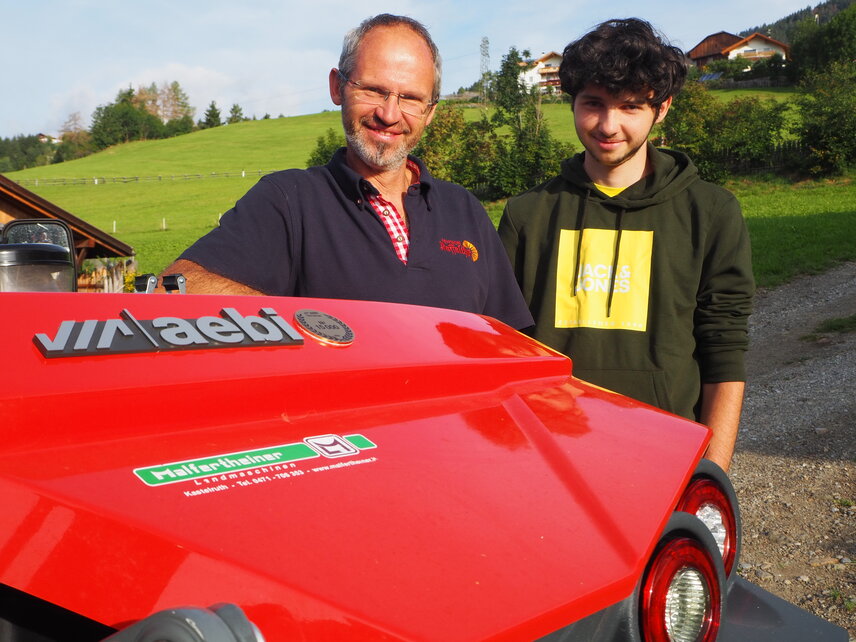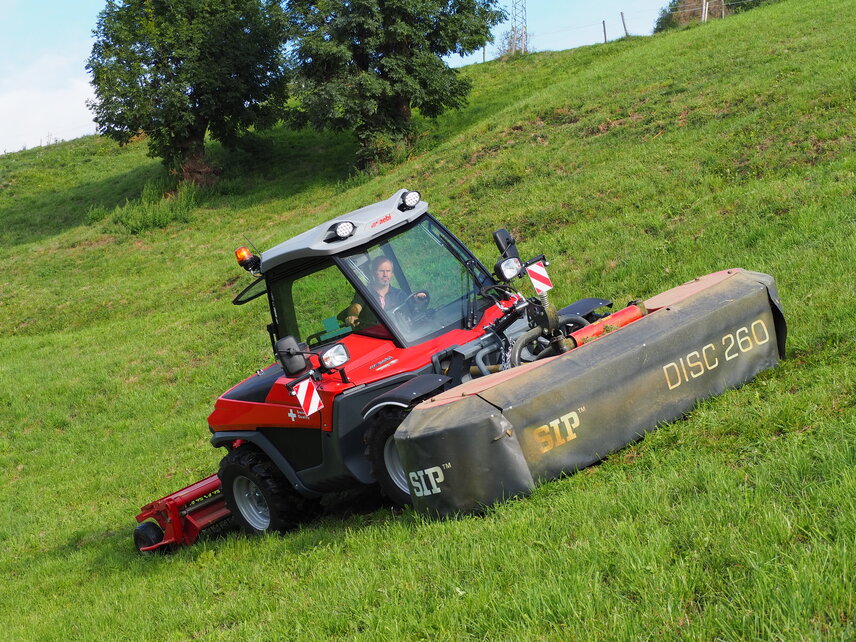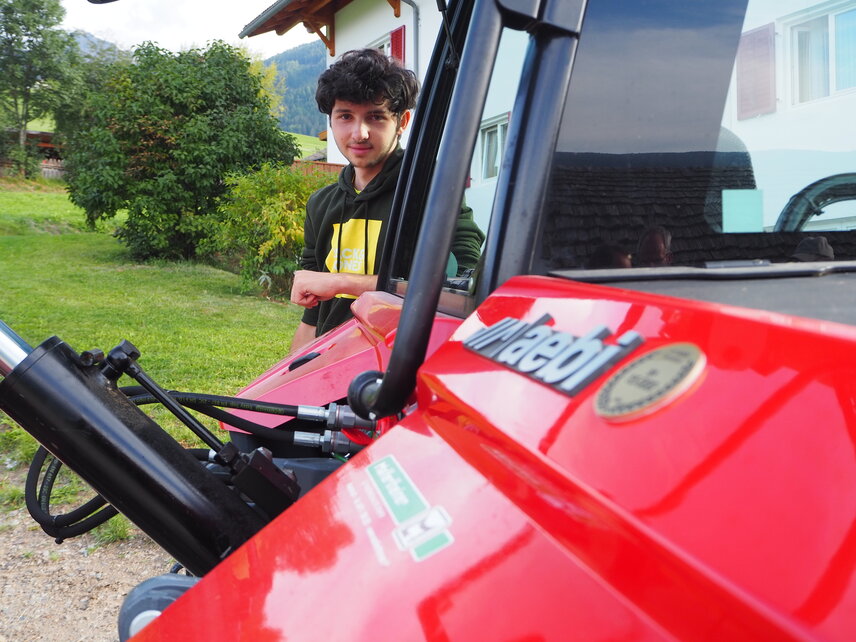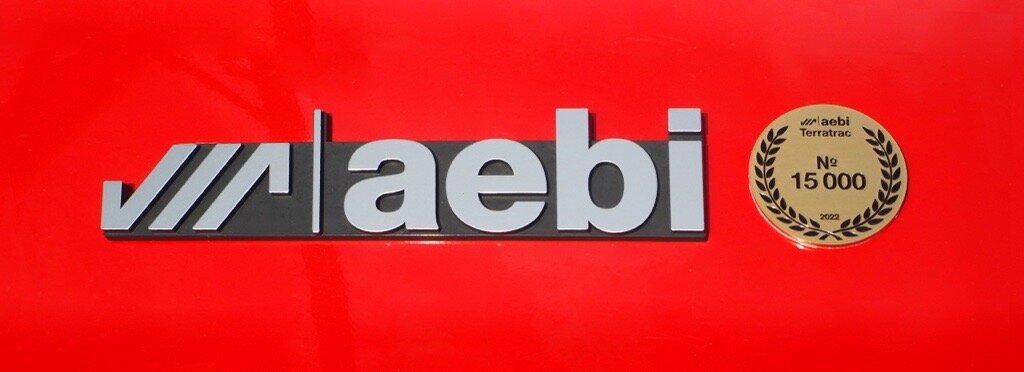It's steep at Schmid's in Terenten in South Tyrol. Michael and Brigitte Schmid run their farm in that German-speaking part of Italy, which is a region as picturesque as it is steeped in history. As in the entire Alpine region, the area here is a cultural landscape - for centuries every square metre has been cultivated, mown and grazed. Schmid's farmyard, the «Raffalthof», covers about 50 hectares, of which 13 hectares are mowing meadows, 24 hectares are forest and the rest alpine pastures and meadows. They keep 30 dairy cows and 10 young cattle, which live in a modern free-range barn built only in 2020. The milk is turned into mozzarella at the dairy in the nearby city of Brixen.
As with so many mountain farmers in South Tyrol, farming is not the only mainstay of the Schmid family. Brigitte's realm is the guesthouse, which is open all year round and has 40 beds that are very well booked, especially in summer. The guesthouse doesn't work without the farm and the farm doesn't work without the guesthouse. Without the farm, the guesthouse would be much less attractive. And as the guesthouse generates more than half of the total income, it guarantees that the farm can be maintained. "You can't expect your children to take over a run-down farm at some point," says Michael Schmid.

The new Terratrac TT281+
The «dual strategy» on the farmyard has always included a Terratrac. The new Aebi TT 281+ now enables Michael and Brigitte to hand over a modern farm to their son Simon and shows the residents of the guesthouse how today's mountain farming works. For Aebi, it is the fifteen thousandth TT since the start of production of the then revolutionary concept in 1976, for the Schmid family it is the third. «We had the last one for ten years, no problems, no repairs. We’ve exchanged it now because there are very attractive tax incentives in Italy at the moment and because the local Aebi dealer Christian Malfertheiner was able to make us a very attractive offer», says Michael. However, he and his son Simon only realised after delivery that the old and new model are worlds apart and that the engine in particular is much more powerful.
Weight distribution is crucial
Simon is 17, goes to agricultural school and develops more and more into the «technical manager» of the farm. With him and for him, Michael is getting the farm in shape so that it will remain attractive for decades to come. The TT 281+ is a decisive building block: «Especially on steep slopes, it gives us the decisive moment of security," says Michael. A pretty relevant argument, as the grass grows well on the sunny south-facing slopes of Terenten at 1200 metres above sea level, making it possible to have three or four cuts per season. This demands a lot from the machine, especially when the disc mower is mounted at the front and the articulated conditioner at the rear. The two attachments demand full power from the vehicle.
Heavy or large implements with high power both in the rear and in the front also means that the weight distribution of the vehicle has to be right. The design of the TT with its low centre of gravity, wide track and powerful brakes has always resembled a racing car rather than a tractor. Weight distribution without attachments is roughly two-thirds rear, one-third front. With the mower at the front and the conditioner at the rear, the weight distribution can be perfectly optimised with the right balance setting. A perfect trim, as we would say in maritime and aviation industries. The trim of the vehicle is not a theoretical technical matter. The fact that with the right adjustments the masses practically cancel each other makes the TT 281+ very agile in combination with the powerful engine. There are safety and power reserves in every situation on a steep slope, no matter how difficult.

Different Terratracs for father and son
The comfortable cabin and the individually programmable controls are also crucial for safety and productivity. The latter in particular are the domain of Simon, who places each function precisely on the button that suits him best. Father and son thus each have their own, completely different Terratrac.
Just as important as an ergonomic cockpit is a quiet, dust-free cabin. Air conditioning is standard in cars, but was long considered a luxury in agricultural machinery. Actually, it should be the other way round. Those who spend most of the day on their implements appreciate a dust-free, soundproofed, cooled or heated cabin. Heat, dust, noise and vibrations have been proven to reduce the ability to concentrate. In the modern cabin of a TT 281+ it is easier to concentrate into the evening - crucial for occupational safety and health prevention.

Clever planning and maintenance throughout the lifecycle
The fact that there were no problems with the Schmid family's last Terratrac is also due to agricultural machinery dealer and service partner Christian Malfertheiner. He knows exactly what his customers in the region need, keeps an eye on the service intervals and ensures that the machine is properly maintained. Particularly with expensive and complex implements, reliability is neither coincidence nor luck. It’s a result of clever planning already during development and production as well as to decades of experience of dealers and service technicians such as of the team of Malfertheiner Landmaschinen. They know both the machines and the environment so well that they can deliver new machines at the right moment at ideal conditions. Michael Schmid emphasises: «The dealer and his service are just as important to me as the machine. He sees the problems before they arise, and if there's ever a problem, he's there right away». The fifteen-thousandth Terratrac at Schmid's in South Tyrol will most probably not be the last and not the only one to show to guests how modern mountain farming works.
